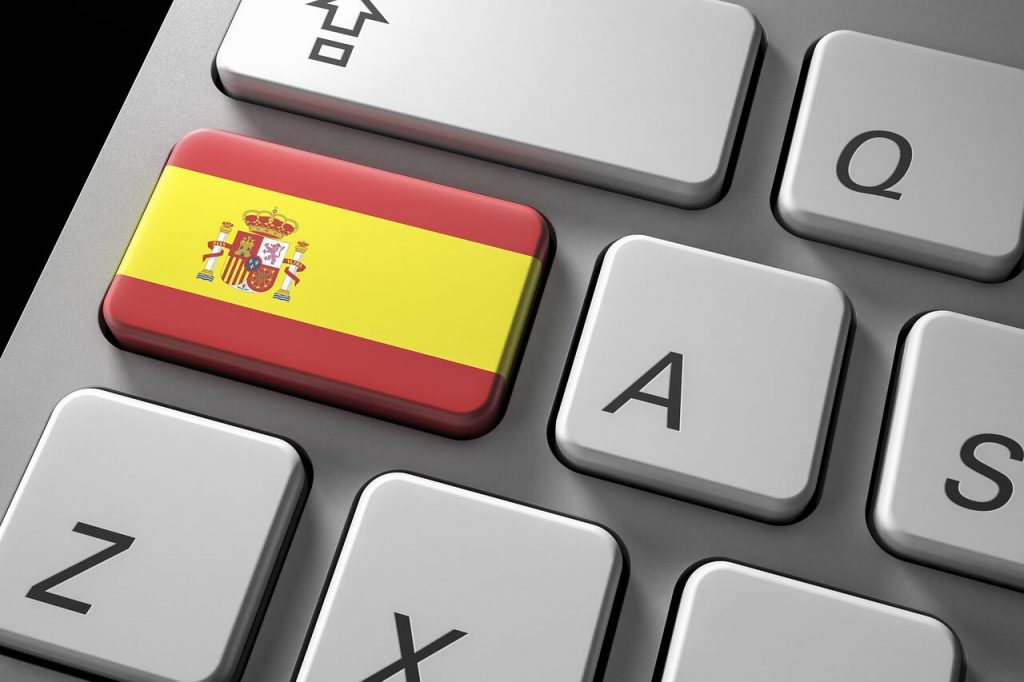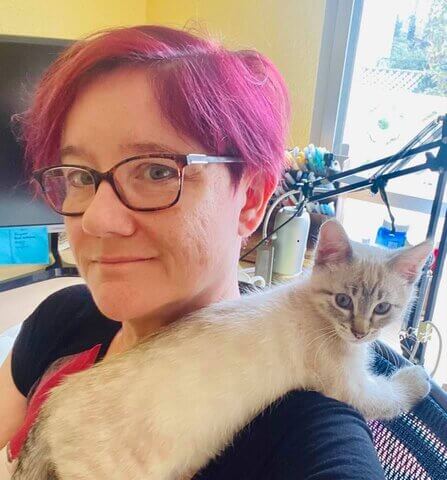comparing business formation options in spain and estonia
A Spanish autónomo or sociedad limitada, or an Estonian OÜ? Finding the best digital business solution when living in Spain.

Maya Middlemiss is a British e-resident living in Spain. Maya wrote this article comparing business formation options in Spain and Estonia based on her own experience as well as expert advice from Barcelona-based accountant and e-resident Louis Williams of Entre Trámites.
I remember the day I opened my sociedad limitada (SL), my Spanish limited company. My accountant presented me with an inked stamp — for signing official documents, like those at the very expensive notary we had just attended. CLUNK went the stamp down on the page (every page) of the constitutional document — which, even for a sole trader, was so lengthy it had to be bound into a little booklet.
Admittedly this was over a decade ago, but compared with my Estonian e-ID, it feels like something that could have happened in another century. I might as well have been pressing my thumbprint or a signet ring into a waxed seal to constitute my new business. After the weeks of waiting, not to mention paying out a significant chunk of share capital, this degree of ceremony was surely the least I deserved?
At the time, there was no such thing as Estonian e-Residency. So as a Spanish resident, opening an SL was my only option — cumbersome, expensive, and protracted. Even when I needed to close down this Spanish business a few years later, the costs and administrative hassle involved to accomplish this were eye-watering.
Fast forward to 2018, when I opened my Estonian osaühing BlockSparks OÜ and everything became simpler. I did so because I nearly missed out on a lucrative freelance contract as the (non-EU) client involved would only do business with a distinct legal entity.
When comparing Spain and Estonia - it makes sense for me to do business digitally with e-Residency out of the small Baltic nation even though I live in the Mediterranean.
Modern business formation in Spain and Estonia
I still live here, but for various reasons prefer to operate my business from Estonia.
So, are things different now in Spain?
To get a more up-to-date picture of what opening a Spanish business involves in 2022, I spoke with British-born Estonian e-resident Louis Williams, whose Barcelona-based accountancy business Entre Trámites helps local and international residents navigate such things — including cross-border trade and taxation.

“Things have improved”, he assured me, although there are still complications.
“Spain is talking about startup legislation to reduce the €3000 capital requirements, which you still need to pay (or have business materials notarized for the valid equivalent value),” he explained. “But there are now lots of company incorporation offices across Spain, private or government run, where they can prepare a template company incorporation document, using your personal digital certificate, and launch a limited company for you, which limits the amount the notary can charge as well.”
You can’t progress to this stage until your business name is approved at the mercantile registry though, and you need to submit your 5 potential names and wait — because you can’t even pre-check the name availability anywhere.
With the help of a firm like Louis’ and the new digital ID, the process is reduced from the months it took me in 2009, to a matter of weeks. But the differences between Spain and Estonia are still hard to fathom. To anyone used to Estonian ways of doing business, where the record time for company incorporation was recently set at 15 minutes and 33 seconds, opening an SL in Spain is still in the dark ages.
Self-employment in Spain
It's no wonder then that many solopreneurs in Spain opt for self-employed (autónomo) status to avoid company formation. This offers no protection for personal liability, but avoids the setup costs and delays, as well as the higher ongoing monthly accountancy fees for a limited company.
“The income level at which a limited company is more advantageous in Spain is around €60,000-70,000,” Louis explained, “especially if you want to build up capital in the business, start employing local people, or work as an agency.”
The Estonian OÜ route is an option for Spanish residents, but they need to be careful to avoid permanent establishment in Spain. International tax law focuses on the concept of ‘substance’ — the extent to which a company or organization has operational and economic activity in a country. It includes things like offices, assets, and employees.
For digital nomads, who never reach 183 days physically in Spain or anywhere else, permanent establishment may not be an issue. Also, anyone operating an entirely virtual business with no fixed assets could be less at risk. But it’s essential to get individual professional advice, because Estonia is definitely not a tax haven. And accumulating profit in an overseas entity — such as an Estonian OÜ — can create tax risks for Spanish residents as well.
Operating an Estonian business while living in Spain will generally mean paying social security locally in Spain. The amount of social security to be paid has recently changed, towards a more income-dependent scale — but as Louis pointed out, it’s still very onerous for low earners:
“For high-earning entrepreneurs in Spain who are self-employed, it's actually a very advantageous system, because you pay a very low flat rate. In comparison to other countries where you pay a percentage of your income, you can get a lot. So, what you have in Spain is a very regressive self-employment system,” he explained.
Spanish residents are also liable to pay income taxes in Spain (including on foreign-earned income). The rate is between 19–47%, charged progressively according to income earned.
Startup culture or status quo?
Genuine innovation always involves risk, and that risk is costly in Spain, where those social security fees kick in from the start, and offer no room to fail (you get access to a discount as a new autónomo, but only once every 3 years.) And as for growth, that attracts even higher risk…
“The biggest barrier to Spain's future is a combination of labor protection and labor law. This makes it very hard and risky to hire people,” Louis continued, “and creates a very high level of social security burden at the lowest level.
“It is a country which attracts many people to move here. But it has some critical flaws, and some of the Estonian stuff can help limit the damage in that. With an Estonian OÜ, allowing some entrepreneurial people to start up [a limited company], while being a freelance / autónomo, is a preferable solution. But it is critical never to build up that cash and profit overseas.”
Ultimately, historically, Spain is a country with a tax structure essentially favoring wealth accumulated in families and across generations. This locks in wealth inequalities and creates low social mobility and almost a feudal system. “The concept of an entrepreneurial class is a very recent phenomenon,” Louis pointed out.
It’s a stark contrast to the startup culture intrinsic to Estonia. Indeed, the business cultures of both Spain and Estonia have roots in each country's fascinating histories. Such is the diversity within Europe’s richly varied continent.
Saving on paper and out-of-pocket expenses
As an immigrant to Spain but with an Estonian OÜ, I enjoy a level of frictionless administration that would be unrecognizable for a local business here. Invoicing and accounting is easily done in multiple currencies. I can file expenses via forwarding mail-drop, declare taxes, and submit my annual report in moments using my Estonian ID. It’s also easy to subcontract work out to other freelance associates anywhere in the world.

For my local expenses as a Spanish autónomo I have to digitize my own receipts, break them down for tax in a spreadsheet every quarter, and send them to my accountant on paper by post. I need to ensure every expense I wish to file has a detailed factura (invoice), including my name and financial identification numbers.
This not only takes time but creates loads of out-of-pocket costs I simply have to absorb out of taxed income, because it’s impossible to obtain acceptable evidence for them made out to me directly.
In contrast, Estonia accepts that a flight ticket in my name taking me on a business trip is a legitimate expense. There is no need to contact the airline for a personalized invoice…which I have been requested to do in Spain. Just one example of how much simpler it is doing business in digital Estonia.
Spain and Estonia: the future is business without borders
Simply managing my business accounting virtually makes it worthwhile to operate as a distinct limited company via a third country, rather than attempt to conduct all my work as a Spanish freelancer. I even have to use a third-party service to raise my monthly invoices as a self-employed freelancer, to my Estonian business.
So, I love the fact that my Estonian e-Residency allows me to live and work as a Spanish resident, paying my social security and taxes locally.
Apply for e-Residency
The existence of e-Residency gives me hope for a transnational global world to come, as different countries unlock and travel opens up again, and we can embrace global ways of doing business in the 21st century. Meanwhile, the number of Estonian e-Residents in Spain continues to grow faster than all other countries.
More from e-Residency
- Sign up for our newsletter
- Watch fresh video content - subscribe to our Youtube channel
- Meet our team and e-residents - register for our next Live Q&A